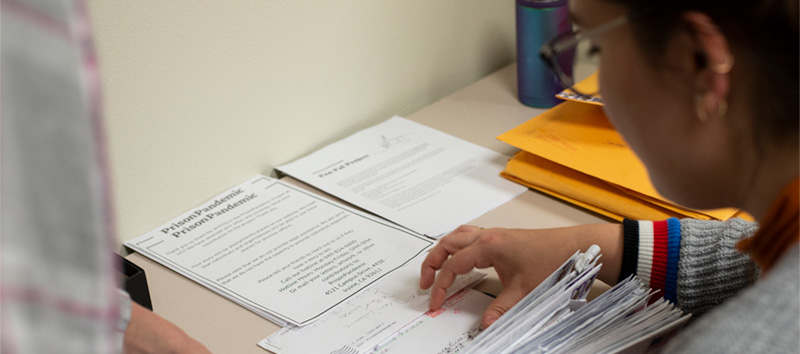
UCI Libraries Helps Create Ethical and Sustainable Archival Record of PrisonPandemic
UC Irvine’s PrisonPandemic project has received a new nearly $350,000 grant from the Council on Library and Information Resources (CLIR), Digitizing Hidden Collections: Amplifying Unheard Voices. In its initial, extended collection phase, the project documented the COVID-19 crisis in prisons and jails by collecting stories from people incarcerated in California. The new CLIR grant will support the creation of a digital archive to ensure the long-term preservation of these materials.
A key team member helping to realize the digital archive is Elvia Arroyo-Ramirez, digital archivist in the UCI Libraries. Under the CLIR grant, Arroyo-Ramirez will be responsible for advising and overseeing the ethical digitization and preservation of the PrisonPandemic’s collection.
“We’re so excited to be partnering with Elvia and the UCI Libraries on this project,” says Kristin Turney, one of the cofounders of the PrisonPandemic project and professor of sociology at UC Irvine. “Elvia brings considerable expertise to this project.”
RESPONSIBLE ARCHIVING AND DIGITIZATION
Turney explains that the project is transitioning away from its initial story-collecting phase and the CLIR grant will allow the team to digitize and preserve the materials submitted. The PrisonPandemic project received more than 3,000 physical letters and pieces of artwork from people incarcerated, their family members and loved ones, and the staff who work in these facilities. Using funds from the new CLIR grant, PrisonPandemic’s founders and principal investigators are partnering with the UCI Libraries to make the documents publicly accessible and searchable.
“This digitization work is important for the long-term preservation of these stories,” says Turney. “The other members of our team are trained in sociology, criminology, demography, and law. This type of preservation work is new territory for us, and we couldn’t do this archiving work without Elvia and the UCI Libraries.”
Before starting to process the project’s physical letters, Arroyo-Ramirez explains it was important to first develop an ethical model on how to work with vulnerable populations, such as incarcerated people and immigrant communities, who may face negative consequences or repercussions from coming forward.
“How do you share people’s perspectives and stories while still protecting their identities and respecting their right to privacy?” says Arroyo-Ramirez. “Throughout the project, we're trying to be as careful as possible.”
FREE AND SUSTAINABLE ACCESS
Beginning this summer, the digitization of the PrisonPandemic artifacts will be a three-step process:
- Redacting physical documents to protect identities and maintain anonymity
- Digitizing through scanning and transcription
- Creating tags (metadata) to make the digital records searchable
Arroyo-Ramirez’s role will be to advise and oversee a team of graduate students hired to begin this work in summer 2022.
Once processed, the project’s digital assets will be uploaded into a publicly accessible digital collection on Calisphere, a site developed by the University of California Libraries and maintained by the California Digital Library. The project’s physical collection will be housed within the UCI Libraries.
The redacted collection will give future generations the tools to better understand the toll of COVID-19 on marginalized populations.
Turney explains that the archive will increase public knowledge and awareness of the inequalities experienced by incarcerated people.
“With this archive, people in the future will be able to learn about what it was like to be incarcerated during COVID-19,” she says.
LEARN MORE
In addition to the CLIR grant, the PrisonPandemic project was previously awarded a $157,500 Sustaining Public Engagement Grant from the American Council of Learned Societies, a $70,000 grant from Arnold Ventures, and a $50,000 grant from the National Endowment for the Humanities. Altogether, the PrisonPandemic project grant funding totals approximately $630,000.
To explore a curated selection of stories that illuminate key themes and topics about the pandemic in California carceral facilities and learn more about this project, visit the PrisonPandemic webpage.
To learn more about the special collections within UCI Libraries, visit the Special Collections & Archives webpage.

